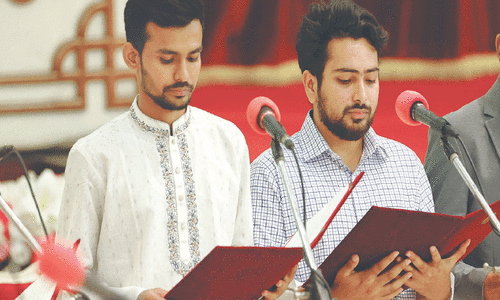
A dangerous political vacuum seems to be enveloping Bangladesh, casting uncertainty over its democratic and economic future. This instability could have broader regional implications. Whether the Dr Muhammad Yunus-led interim government can steer the country away from deeper crises remains to be seen.
Technocrats typically struggle with navigating complex political landscapes, but Dr Yunus is no ordinary expert. A Nobel Laureate, Dr Yunus returned to Bangladesh from the US in 1972 as a 31-year-old economist eager to contribute to nation-building after independence.
He founded Grameen Bank, revolutionising the banking sector by proving the creditworthiness of the poor, boasting default rates lower than commercial banks on microloans issued without collateral. He contributed to transforming Bangladesh from a ‘basket case’ in 1971 to a rising star by 2024.
Now, at 84, Dr Yunus has returned once again, this time as chief advisor to the interim government, tasked with rescuing the nation from internal turmoil after a student-led movement evolved into a civil rights uprising that toppled the government.
‘The crisis appears to stem from a toxic mix of extreme wealth concentration amid widespread economic hardship, coupled with an authoritarian state’
A UK-based public policy advisor commented, “It’s not just about age, though that certainly plays a role; what’s more concerning is that Yunus accepted this responsibility that he turned down in 1996. This is despite his unsuccessful four-month foray into politics earlier.
“After the success of Grameen Bank, in 2007 he founded a political party, Nagorik Shakti (Citizen Power), intending to contest elections but ultimately abandoned the idea due to lack of support. Unless he can assemble a capable team with strong political acumen, his chances of succeeding in this role to stabilise Bangladesh without compromising on democratic values, seem dim.”
Recent developments in Bangladesh, with an impressive average GDP growth rate of 5.9 per cent over the past 20 years, have shocked observers in Pakistan and beyond. Despite a history marked by natural disasters, political instability, military coups, counter-coups and political assassinations of leaders and their families in the initial phase, Bangladesh has made significant strides in both economic and social development over the past 53 years.
It is among the top garment exporters in the world, supplying clothing to top global brands and among top recipients of remittances. Life expectancy in the country has risen from 46.6 years in 1971 to 72.6 years today, with nearly all Bangladeshi children completing primary school and female literacy stands at 73pc.
Infant mortality has dropped to 26 deaths per 1,000 births — the lowest in South Asia — and female labour force participation is at 36pc. The country has successfully controlled its population growth, now at 1pc per year.
So, why still did Bangladeshis violently turn against the Awami League, causing its government to fall and forcing leader Hasina Wajid to flee, despite delivering high growth, reducing poverty, and marked improvement in human development indicators?
A human rights lawyer offered a thought-provoking response. “Democratic rights are never handed out on a platter; they are earned, often at great cost. People have sacrificed their lives for freedoms that go beyond mere survival.
“In the face of discrimination, repression and denial of rights, people are bound to react, potentially threatening stability, especially in South Asia, where there is a history of strong political instincts and a culture of argumentation prevails.
“It’s unfair to draw direct parallels between multi-lingual, multi-ethnic Pakistan and the homogeneous Bangladesh. However, there are important lessons to be learned from Bangladesh, a nation better known for its cyclones, fish, rice and rich cultural heritage.
“In Pakistan, simply avoiding default or maintaining ‘perfect harmony’ with the military may not suffice. Prime Minister Shehbaz Sharif must also address the growing perception of political persecution and media repression to complete his government’s term. If the people continue to feel suffocated, the risk of them rising up to demand their freedoms will persist,” he stated.
Pakistan’s business class, long admirers of Bangladesh’s investment climate, is puzzled by recent events. Those with investments in the country are closely monitoring the situation, staying in touch with local partners to safeguard their interests amidst the volatility.
Some analysts have raised doubts about the credibility of the data that painted such a positive picture of Bangladesh. “Either the data was manipulated to present a misleading narrative, or the growth was highly unequal that drove the populous country towards crisis,” stated a critic.
Others attributed the upheaval to political repression. “In recent years, Bangladesh’s record on political and human rights has deteriorated sharply. Under Sheikh Hasina’s government, which assumed power in January for the third consecutive term after controversial elections boycotted by the opposition, reports of torture, disappearances and unfair jail terms have become alarmingly common.
“The government’s intolerance of dissent further fueled public discontent. Student protests demanding fair job opportunities shattered the uneasy silence, sparking a civil rights movement that quickly gained momentum. Within weeks, the movement forced dissolution of the parliament and the resignation of prime minister Hasina, who was compelled to flee for her life,” a commentator noted.
Ahmed Qadir, an economist based in Islamabad, argued that South Asia’s challenges are deeply rooted in extremism and inequality. “The crisis in Bangladesh appears to stem from a toxic mix of extreme wealth concentration amid widespread economic hardship, coupled with an authoritarian state seen as betraying the majority to serve the interests of a tiny elite,” he observed.
Younus Dagha, former federal secretary and interim provincial minister, now heading the Policy Research and Advisory Council (PRAC), believes that the quality and the perception of governance are almost as crucial as economic performance. “This isn’t the first time a leader who delivered growth had to step down under public pressure,” he noted.
Published in Dawn, The Business and Finance Weekly, August 12th, 2024















































Dear visitor, the comments section is undergoing an overhaul and will return soon.